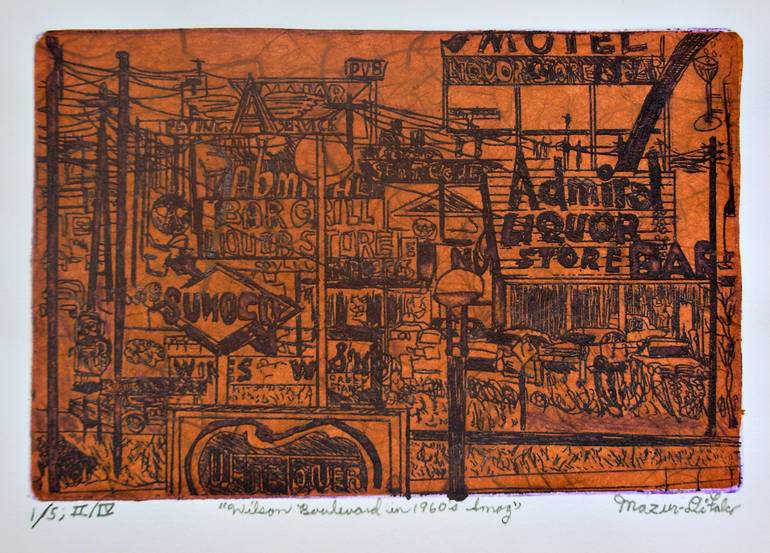





25 Views
2
View In My Room
Open Edition Prints Available:
Select a Material
Canvas
Select a Size
16 x 12 in ($190)
Select a Canvas Wrap
Black Canvas
Add a Frame
No Frame
$190
25 Views
2
Artist Recognition

Artist featured in a collection
ABOUT THE ARTWORK
DETAILS AND DIMENSIONS
SHIPPING AND RETURNS
This etching—disturbing and haunting—depicts a section of the artist’s home city of Camden, New Jersey. He employed the studio techniques of intaglio, aquatint, Chine colle, and drypoint on a zinc etching plate and developed the image in four Nitric acid baths. This hand printed work—executed on a...
Year Created:
2020
Subject:
Medium:
Print, Giclee on Canvas
Rarity:
Open Edition
Size:
16 W x 12 H x 1.25 D in
Ready to Hang:
Yes
Frame:
Not Framed
Canvas Wrap:
Black Canvas
Packaging:
Ships in a Box
Delivery Cost:
Calculated at checkout.
Delivery Time:
Typically 5-7 business days for domestic shipments, 10-14 business days for international shipments.
Returns:
All Open Edition prints are final sale items and ineligible for returns. Visit our help section for more information.
Handling:
Ships in a box. Art prints are packaged and shipped by our printing partner.
Ships From:
Printing facility in California.
Need more information?
Need more information?
Jerry Difalco
United States
Imagery and storyline—both vital components of my creative process—enable me to create a form of visual poetry. Consequently, photography is intricate to my artistic strategy, especially with regard to my etchings. In view of this, many of my printed images—accomplished via the studio techniques of intaglio, aquatint, drypoint, and Chine collè—originate from my own photographs, as well as ones I uncover during research into the archives of academia, historical societies, and museums. Upon locating a scene that fascinates me, I first sketch a few original drawings of the likeness, and next transfer that drawing onto my prepared zinc etching plate. NOTE: In my etchings that incorporate the Chine collè process, I use mulberry bark paper from Thailand, which is infused with Japanese kozo threads. The paper is also treated with methylcellulose. I endeavor to establish links between the metaphysical and physical worlds . . . between the realms of dream and reality . . . and between the natural and the fabricated. In a sense, I believe that art unveils everything that we mask behind our assumptions and biases . . . or rather, those realms we neglect—or refuse—to perceive. My label for our failure to examine these areas is, “The Phenomenology of Non-Connectedness", which I blame on today’s communicational tools such as Social Media, the Internet, texting on smart phones, and “tweeting”. MY ETCHING TECHNIQUE I work on metal etching plates treated with both hard and soft grounds. These grounds consist of mineral spirits, beeswax, oil of spike lavender, and other natural substances. After these grounds dry, I draw images with needles and other tools onto the plate. Next, the exposed areas are “etched into” the zinc or copper plate in a bath of Nitric Acid and spring water. An artist’s proof in then printed after the plate is cleaned; Moreover, two to seven additional plate workings, acid baths, and proof printings occur before my desired effect is obtained. When satisfied with my end result, I apply oil based etching ink onto the clean plate and then remove the excess ink with several wipes. Next, I align my etching plate onto the printing press bed and cover it with papers and press blankets. Finally, the plate goes through the press to obtain my print. This process is repeated until all editions are created. I usually create three to five editions of five or six etchings for each one of my plates.
Artist Recognition

Artist featured by Saatchi Art in a collection
Why Saatchi Art?
Thousands of
5-Star Reviews
We deliver world-class customer service to all of our art buyers.
Global Selection of Original Art
Explore an unparalleled artwork selection from around the world.
Satisfaction Guaranteed
Our 14-day satisfaction guarantee allows you to buy with confidence.
Support Emerging Artists
We pay our artists more on every sale than other galleries.
